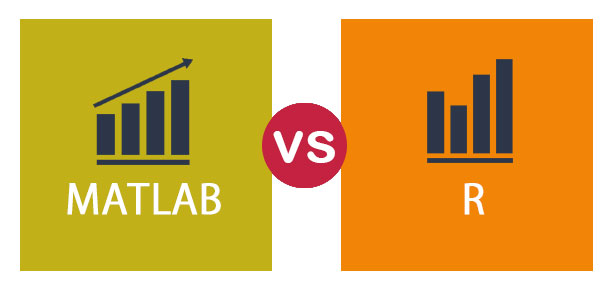Updated May 11, 2023
Difference Between MATLAB and R
The name MATLAB stands for matrix laboratory. Matlab is a multi-paradigm numerical computing environment and proprietary programming language developed by the company called MathWorks. Matlab allows various functionalities to be performed, like matrix manipulations, plotting of functions and data, implementation of algorithms, the creation of user interface, and interfacing with programs written in various other programming languages like C, Java, C++, and Python, and many more. R is a programming language and free software environment for statistical computing and graphics supported by the R Foundation for Statistical Computing. R and its libraries implement various statistical and graphical techniques, including machine learning algorithms like classification, clustering, time-series analysis, data modeling, etc.
What is MATLAB?
Matlab features an application-specific solution called toolboxes. It is an essential feature of Matlab that allows us to learn and apply specialized technology. Toolboxes provide a set of Matlab functions called M-files that solve specific problems. There are various areas where toolboxes are available, like signal processing, control systems, neural network, simulations, and many other areas.
What is R?
The features of R are extended through user-created packages. These packages are developed primarily in R and sometimes in Java, C, C++, and Fortran. R is a command-line tool with many graphical IDEs like RStudio and R Tools for Visual Studio. Some common editors supporting R include Eclipse, Notepad++, WinEdt, etc. R functionalities are also accessible through scripting languages like Perl, Ruby, Python, etc., and high-level languages like Java, .Net, etc.
Head To Head Comparison Between MATLAB and R(Infographics)
Below are the top 7 differences between MATLAB vs R:
Key Differences Between MATLAB and R
Both are popular choices in the market; let us discuss some of the major key differences:
- Classes and Objects: Object-Oriented programming brings excellent simplicity to the program. In Matlab, a class can be defined as a folder or directory of functions used to work with objects of that class, whereas in R, classes are available in the form of Packages.
- Installation: R can run on any operating system, but Matlab cannot run the same licensed version on different operating systems unless others are installed on the same physical machine.
- Usage: R is used to solve problems related to statistics, whereas Matlab is used for other aspects of mathematics such as calculus, plotting graphs, etc. R has many prepackaged programs that help to solve analytical problems, so in the analytics field, R is preferred over Matlab.
- Learning Curve: R can be difficult for those new to the programming language as R uses natural syntax. Since it is open-source, R has many open-source codes available that might help users get started. On the contrary, Matlab is easier to learn as it has a lot of toolboxes for most of the functionalities. Since Matlab requires a license amount of code available online is scarce.
- Preferred Language: R is the selected language for data analysis by most industries, whereas many Universities mostly use Matlab.
- Add-on Products: Matlab has a lot of add-on products available to perform various tasks. One of them is Simulink. It is a graphical programming environment for modeling, simulating, and analyzing multi-domain systems. R doesn’t have any add-on products. As such, it has many packages that must be included in the program.
MATLAB vs R Comparison Table
Below is the topmost comparison between MATLAB vs R:
| The Basis Of Comparison | MATLAB | R |
| Open Source | Matlab is not open source. It is available as a paid version. | R is open-source. |
| Speed | Matlab is faster than R. | R is slower than Matlab. |
| Functionalities | Matlab performs various engineering applications like image processing, matrix manipulation, machine learning, signal processing, etc. | R is mainly used for statistical analysis and data processing. |
| Ease of Use | Matlab is easy to program very complex things as many toolboxes are available. | R follows programming language syntax, which might be difficult for newbies in the programming world. |
| Availability of Libraries | Most of the functionalities are available in a toolbox that provides various functionalities. | R has a lot of packages with various functionalities. |
| Language Type | Matlab is a high-level language. | R is an interpreted language. |
| Community Support | Matlab is Licensed, so it has a closed community. | Since it is open, it has a lot of community support. |
Conclusion
We have listed most of the differences and compared both MATLAB vs R languages with each other. Also, considering the educational value of each programming language in terms of teaching, we can say that R can provide a competitive advantage while looking for a job in analysis. Since R is open-source, an individual can contribute and give a lot of online code that might help others learn the language. As far as Matlab is concerned, this is also a widely used language. Any individual who wants to play around with the concepts of data analysis, data science, or any other mathematical operations without involving much of the coding can use this tool. Since it is a paid version, the online availability of this tool could be an issue. So, anybody wanting to learn data science independently can use the R language since it is open-source.
Recommended Articles
This has been a guide to the top differences between MATLAB vs R. Here we also discuss MATLAB vs R key differences with infographics and a comparison table. You may also have a look at the following articles to learn more –




